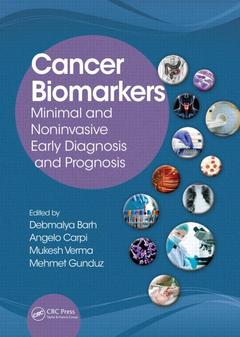Cancer Biomarkers Minimal and Noninvasive Early Diagnosis and Prognosis
Coordonnateurs : Barh Debmalya, Carpi Angelo, Verma Mukesh, Gunduz Mehmet

Gleaning information from more than 100 experts in the field of cancer diagnosis, prognosis, and therapy worldwide, Cancer Biomarkers: Non-Invasive Early Diagnosis and Prognosis determines the significance of clinical validation approaches for several markers. This book examines the use of noninvasive or minimally invasive molecular cancer markers that are under development or currently in use. It deals with a majority of commonly prevalent cancers and can help anyone working in the health-care industry to recommend or develop early diagnostics, at-risk tests, and prognostic biomarkers for various cancers.
It explores the practice of determining biomarkers by their characteristics and relative methodologies, and presents the most recent data as well as a number of current and upcoming early diagnostic noninvasive molecular markers for many common cancers. It also considers the sensitivity and specificity of markers, biomarker market, test providers, and patent information.
Approximately 30-35 Cancer Specific Noninvasive Molecular Diagnostic Markers in a Single Volume
The book details the general and technical aspects of noninvasive cancer markers. It covers imaging, cutting-edge molecular technologies for biomarker development, and noninvasive or minimally invasive sources of molecular markers, as well as quality control and ethical issues in cancer biomarker discovery. It also provides a detailed account of brain, head and neck, and oral cancer markers, and provides information on a number of gastrointestinal cancers, lung cancer, and mesothelioma markers.
Emphasizes the Importance of Volatile Markers in Early Cancer Diagnosis
- Presents noninvasive early molecular markers in urological cancers
- Describes gynecological and endocrine cancer markers
- Details noninvasive markers of breast, ovarian, cervical, and thyroid cancers
- Addresses hematological malignancies
- Contains information on noninvasive molecular markers in myelodysplastic syndromes, acute myeloid leukemia, Hodgkin?s lymphoma, and multiple myeloma
- Provides comprehensive information on diagnostic and prognostic biomarkers in cutaneous melanoma
This text considers molecular technologies for biomarker development, noninvasive or minimally invasive sources of molecular markers, and quality control and ethical issues in cancer biomarker discovery.
Part I General and Technical Aspects. Quality Control and Ethical Issues of Cancer Biomarker Discovery. Imaging Techniques in Cancer Diagnosis. Role of PET in Cancer Diagnosis. Innovative Tools for Early Detection of Cancer. Noninvasive Nanodiagnostics for Cancer. Mitochondrial DNA in Early Cancer Diagnosis and Screening. Circulating miRNA Biomarkers in Various Solid Cancers. Stem Cell Biomarkers in Early Diagnosis, Prognosis, and Therapy of Cancer. Salivary Biomarkers in Early Diagnosis and Monitoring of Cancer. Part II Brain and Head and Neck Cancers. Biomarkers for Brain Gliomas. Noninvasive Biomarkers in Head and Neck Squamous Cell Carcinoma. Biological Markers in Oral Squamous Cell Carcinoma. Part III Gastrointestinal Cancers. Biomarkers for Gastric Cancer and the Related Premalignant Conditions. Biomarkers in Esophageal Adenocarcinoma. Biomarkers for Diagnosis and Metastasis of Hepatocellular Carcinoma. Noninvasive Early Markers in Gallbladder Cancer. Noninvasive Early Markers in Pancreatic Cancer. Part IV Lung Cancer and Mesothelioma. Noninvasive Early Markers in Lung Cancer. Exhaled Volatile Organic Compounds as Noninvasive Early Molecular Markers in Lung Cancer: Bridging the Gap from Bench to Bedside. Part V Urological Cancers. Noninvasive Early Molecular Biomarkers in Kidney Cancer. Novel Oncomarkers Used for Earlier Detection of Bladder Carcinoma. Screening for Prostate Cancer: New Markers and Future Aspects. Part VI Gynecological and Endocrine Cancers. Early Biomarkers in Breast Cancer. Noninvasive Biomarkers in Ovarian Cancer. Early Markers for Neoplastic Lesions of the Uterine Cervix. Biomarkers in Diagnosis of Papillary Thyroid Carcinoma. Biomolecular Markers for Improving Management of Follicular and Medullary. Thyroid Cancer. Part VII Hematological Cancers. Biomarkers in Myelodysplastic Syndrome. Markers for Diagnosis, Prognosis, and Therapy of Acute Myeloid Leukemia. Biomarkers in Hodgkin’s Lymphoma. Multiple Myeloma and Evolution of Novel Biomarkers and Therapies. Part VIII Melanoma. Diagnostic and Prognostic Biomarkers in Cutaneous Melanoma. Index.
Debmalya Barh (MSc, MTech, MPhil, PhD, PGDM) is the founder and president of the Institute of Integrative Omics and Applied Biotechnology (IIOAB), India. He is a consultant biotechnologist and an active researcher in integrative omics–based biomarkers, targeted drug discovery, and personalized medicine in cancer, neurodisorders, and cardiovascular, infectious, and metabolic diseases. He works with nearly 400 esteemed researchers from 30–35 countries and he has more than 100 high-impact publications. He has edited ten books in the field of omics. He also serves as an editorial and review board member for several highly respected international journals.
Dr. Angelo Carpi Dr. Mukesh Verma
Date de parution : 01-2014
17.8x25.4 cm
Date de parution : 04-2017
17.8x25.4 cm
Disponible chez l'éditeur (délai d'approvisionnement : 14 jours).
Prix indicatif 117,69 €
Ajouter au panierThèmes de Cancer Biomarkers :
Mots-clés :
DNA Methylation; Hrs Cell; Imaging Techniques in Cancer Diagnosis; CAIX Expression; Noninvasive Nanodiagnostics for Cancer; Sentinel Lymph Nodes; Circulating miRNA Biomarkers in Various Solid Cancers; Noninvasive Biomarkers; Biomarkers for Brain Gliomas; Papillary Thyroid Carcinoma; Biomarkers in Myelodysplastic Syndrome; Lymph Node Metastases; TET2 Mutation; Thyroid Nodules; Thyroid Cancer; CA; CA Ix; CTCs; Breath VOCs; Clinical Practice; LC Marker; OSCC Patient; BRAF Mutations; IGF Ii mRNA; Chromophobe RCC; NLPHL; SMAD4 Gene; Clear Cell RCC; BRAFV600E Mutation; Gastric Cancer



